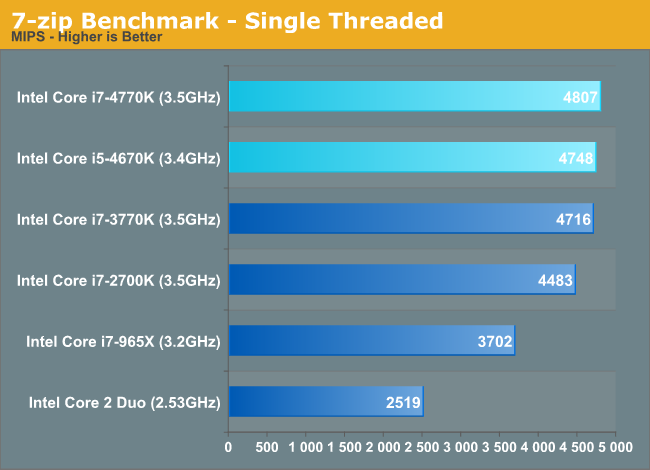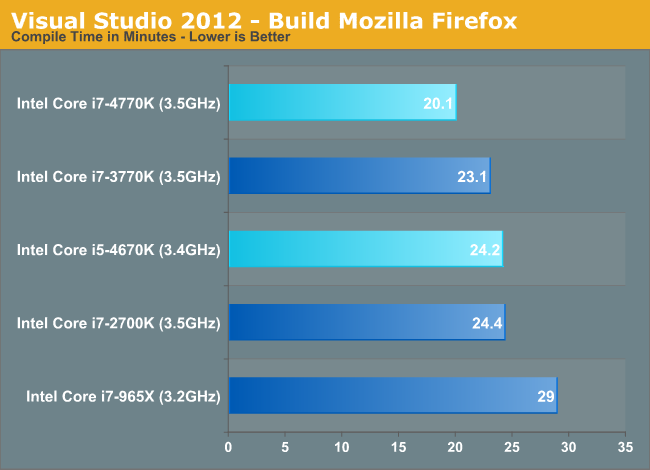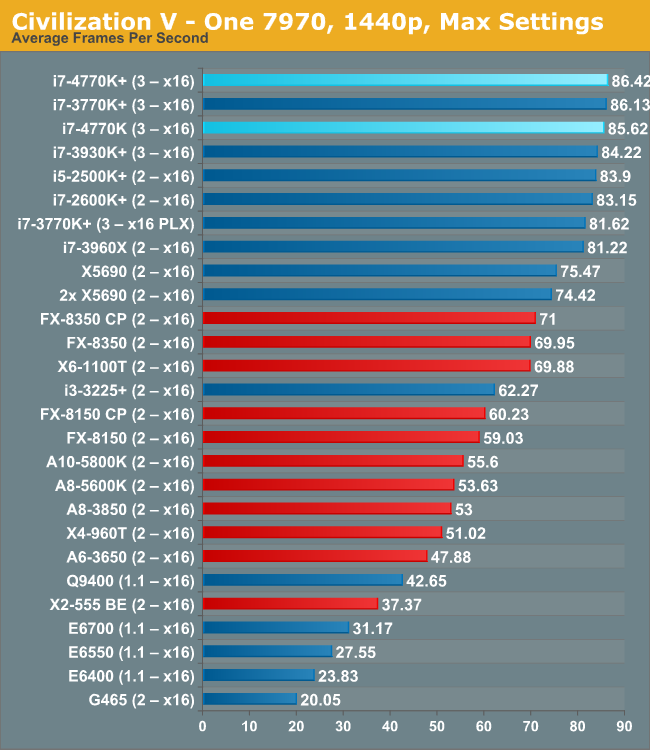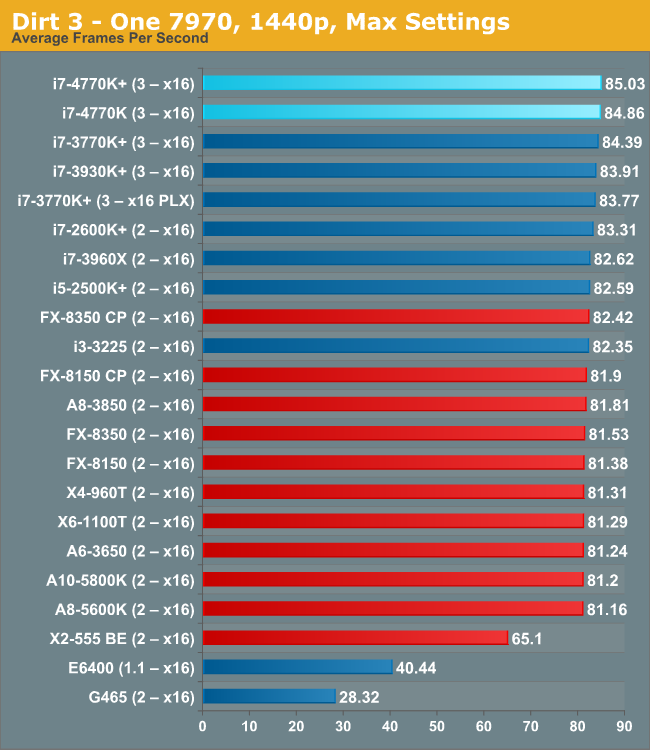The Haswell Review: Intel Core i7-4770K & i5-4670K Tested
by Anand Lal Shimpi on June 1, 2013 10:00 AM ESTCPU Performance: Five Generations of Intel CPUs Compared
For the purposes of our look at Haswell, we will be breaking up our review coverage into two parts. The rest of this article will focus on the CPU side of Haswell, while coverage of the GPU - including Iris Pro and Crystalwell - has been spun off into another artice: Intel Iris Pro 5200 Graphics Review: Core i7-4950HQ Tested.
The majority of the market doesn’t upgrade annually, so I went back a total of five generations to characterize Haswell’s CPU performance. Everything from a 2.53GHz Core 2 Duo through Nehalem, Sandy Bridge, Ivy Bridge and Haswell are represented here. With the exception of the Core 2 platform, everything else is running at or near the peak launch frequency for the chip.
In general, I saw performance gains over Ivy Bridge of 1 - 19%, with an average improvement of 8.3%. Some of the performance gains were actually quite impressive. The 7.8% increase in Kraken shows there’s still room for improvement in lightly threaded performance, while the double digit FP performance gains in POV-Ray and x264 HD really play to Haswell’s strengths.
Compared to Sandy Bridge, Haswell looks even more impressive. The Core i7-4770K outperforms the i7-2700K by 7 - 26%, with an average performance advantage of 17%. The gains over Sandy Bridge aren’t large enough to make upgrading from a Sandy Bridge i7 to a Haswell i5 worthwhile though, as you still give up a lot if you go from 8 to 4 threads on a quad-core part running heavily threaded workloads.
Compared to Nehalem the gains average almost 44%.











Quite possibly the most surprising was just how consistent (and large) the performance improvements were in our Visual Studio 2012 compile test. With a 15% increase in performance vs. Ivy Bridge at the same frequencies, what we’re looking at here is the perfect example of Haswell’s IPC increases manifesting in a real-world benchmark.
Gaming Performance
After spending far too much time on the Iris Pro test system, I didn’t have a ton of time left over to do a lot of gaming performance testing with Haswell. Luckily Ian had his gaming performance test data already in the engine, so I borrowed a couple of graphs.
As expected, Haswell is incrementally quicker in GPU bound gaming scenarios compared to Ivy Bridge - and most definitely at the top of the charts.












210 Comments
View All Comments
eckre - Friday, June 14, 2013 - link
VERY disappointing CPU, if you disregard ALL of the fake synthetic benchmarks, and use only the real world ones, the gains over the 3770K are 0.03%, max 8.8% and average at about a 3% Improvement. 3%? Not worth it. Motherboard? Z87 was suppose to drop PCI but all the motherboards still have it and nothing outrageous. So basically lower power consumption, better on board video performance and no discernible improvement over the 3770K.i7Ahmed920D0 - Monday, June 24, 2013 - link
GOOD BYE 920 D0 Ill never forget you ! Your going to moms rig ! Helllllooooo 4670k with upto 40% better performance for 225 bucks !Yangorang - Thursday, June 27, 2013 - link
There are some rumors that the Haswell desktop processors run fairly hot - can you confirm this at all in your testing?calico-uk - Friday, July 12, 2013 - link
Face it, A consumers market, not a true imagine of technology evolution. Low power with high temps? Just doesn't ring true, unless the chip has been purposely ' Restricted ' with only one cause in mind sales and protection of future sales. In layman's terms Greedy bastards more concerned with markets and money and not the Desktop guy who's impressed with performance. Blame Mac, Windows 8. And your tiny fucking phone.James McGrath - Sunday, August 11, 2013 - link
This test is a little bias against the Core 2 duo I think. What they have done is essentially pitch the very top end on Intel's last 4 generations against a mid to low end core 2 duo. It would be more fair if that generation was represented by a qx9770 or even a Q9650.clyman - Wednesday, October 23, 2013 - link
I have been involved in computer hardware, software and programming since 1986. There has never been a more reliable processor than Intel, at any time. The current ones still have to be tested over time, but I would not buy one. If you put enough case fans with the inferior processors, they might last 2 or 3 years. With an Intel processor, even overclocked with no case fans, provided you used the intel chipset, nearly 100% of them kept running for 5 or more years. Without overclocking, I still don't know when they will die, since none have to my knowledge. I have built at least 100 computers and have only built a couple non intel ones. It was obvious right away how inferior they were to intel. Also, I love my i7 haswell on an asus z87-pro motherboard. There is no need to overclock, the processor and memory score 7.8 out of 7.9 on the windows scale and the onboard graphics scores a 6.8. Not bad ratings. Also, the CPU only uses 7 to 8 watts of power most of the time.numskulll - Tuesday, November 5, 2013 - link
I'm quite happy with my undervolted Athlon 620 and Radeon 4200 graphics. More computing power than I need 99% of the time, estimated tdp of about 55-60 watts (1% of use) and system idle of about 40w (80+% of use). And if I ever play games it takes a few seconds to bung in a suitable graphics card. I doubt it will go belly-up in the foreseeable future, but if it does it only cost £50 second-hand about 3 years ago and would be even less to buy now.duttasanjiv - Friday, November 14, 2014 - link
I am planning to get a new i5 4690 system for 1080p transcoding. I am not interested in GPU assisted transcoding. My focus is on QuickSync assisted transcoding. It is said that latest Quicksync is almost comparable to CPU based transcoding.It is annoying to see all sites compare only obsolate systems with a vague spec. (including AnandTech). Then, they omit any screenshots. Some are so weird thay put the video at youtube!! How can one compare the quality after youtube again transcoded it?
So far I am looking for a scientific, specific comparison on -
1) i5 4690 or atleast 4570 with CPU only & with QS
2) Screenshots in PNG
3) Specifying what settings were used? What QRF / what QCF? What speed presets - 'slow' or medium? What profile - high or main?. 'faster' or 'very fast' settings speed presets is worthless.
2) What is the source format - 1080i or 1080p? How long? What was the target size.
3) What QuickSync performance settings were used? I heard that haswell supports 7 performance vs quality settings. Also never found if QS supports any other parameters.
Merely mentioning FPS or time won't help.
I request you to pl. provide us with such an comprehensive comparison with will help many users like me, to settle all doubts for good. Thx so much in advance...
minitt - Sunday, December 7, 2014 - link
They dropped I5 750 and I7 920 from the gaming benchmark because both the processor will put up decent FPS which will take away most of the lime light from the haswell. A 4.0 ghz clocked i5 750 or i7 920 is still capable of keeping the modern GPUs running at 100% .I would be more than happy if someone can prove me wrong.Miller1331 - Tuesday, December 1, 2015 - link
I have the 4770k in my Desktop which is used primarily for high end music production and it eats up everything I have thrown at it thus far